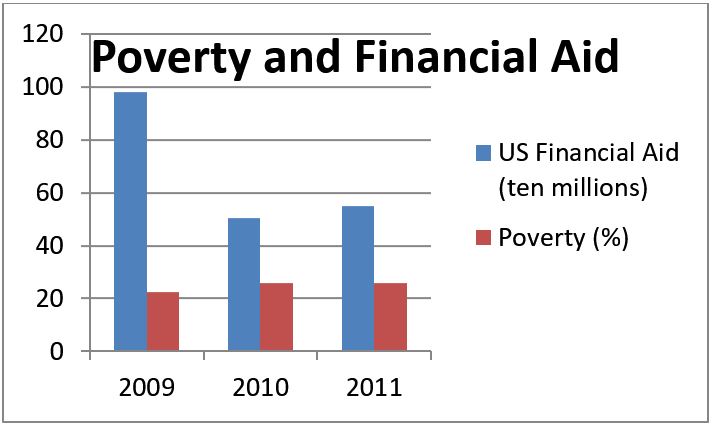How governments distribute foreign aid has been brought to public attention in recent months. This is because taxpayers are very concerned that their taxes are being used to support and finance terrorism and dubious regimes. An example of this concern is the Taylor Force Act in America, which was proposed after the killing of an American army veteran Taylor Force by a Palestinian terrorist. The terrorist’s family is receiving a monthly payment from the Palestinian Authority, which is using money from their foreign aid fund.
The bill has three main objectives:
1) Make sure that the Palestinian Authority is taking the corresponding steps to stop acts of violence against Jews and Americans
2) Urge the Palestinian Authorities to condemn such violent acts and punish perpetrators
3) Stop the financial support of the so-called “martyrs” (people who have committed terrorist acts) and their families.
Incidentally the existing objective of the US Foreign Aid policy is the prevention of terrorism against Israel from Palestinian militant organisations, thus it would be rather surprising if the bill is not passed when it is voted upon later this year.
The United States financial allocation to the Palestinian Authorities has drastically increased since the creation of the Palestinian self-government in 1994. The average aid increased from $70 million in the period of 1994-99 to $170 in the period of 2000-07; to $400 million in the period of 2008-2017, having its highest peak in 2009 with an amount just under $1,000 billion in a single year.
The effect of financial aid on countries has been extensively studied, mostly agreeing that it is harmful to countries that have a bad governance (i.e. a deficient style of governing). The studies indicate that financial aid may encourage corrupt countries to continuing being corrupt. That is, they are not incentivised to improve their political institutions since they are given money regardless of their actions. Financial aid may empower corrupt political leaders and make them less accountable to the taxpayers since their income is no longer dependant on the people they govern. There are additional factors which lead to increase corruption and bureaucratic inefficiency.
Other statistical studies indicate that donor countries usually provide financial aid to countries that are working to reduce poverty and debt and improve regulatory quality (bureaucratic processes) and countries that are accountable and protect civil and political liberties such as freedom of speech and electoral freedom. The reason is the same; it is likely that countries with bad governance may not use financial resources appropriately.
Donor nations are careful when allocating financial aid. Usually, aid is given on condition that recipient nations are transparent and measures are put in place to limit corruption.
Aid given to countries with bad governance has a detrimental effect on the country; therefore, donor nations follow guidelines such as those undertaken by the World Bank.
There appears two common requirements that donor countries consider when allocating funding: I) social reform in the form of poverty reduction, improvement of bureaucratic processes and protection of civil/political liberties and 2) economic sustainability in the form of indebtedness reduction. Looking at these factors, we can assess the possible implications for allocating financial aid to the Palestinian Authorities.
I) Do the Palestinian Authorities have a good enough governance?
This section will help us understand whether financial funds are likely to have a beneficial effect on the Palestinian Territories by considering governance quality. For this reason, we use the Worldwide Governance Indicators (WGI). WGI are the most well-known measures of governance. They are divided into six different categories: Control of Corruption (CC), Political Stability (PS), Rule of Law (RL), Government Effectiveness (GE), Regulatory Burden (RQ) and Voice & Accountability (VA). Our findings are summarised in Table 1 and suggesting that governance in the Palestinian Authorities (PA) is low-quality.

To briefly explain the interpretation of percentiles. Obtaining a percentile of 20%, for instance, means that a country has performed better than 20% of the countries in the sample, but it performed worse than 80%.
The data suggests that 72.4% of the sampled countries have performed better than the PA with regards to Control of Corruption, 93.5% better with regards to Political Stability, 60% with regards to Rule of Law, 78.5% with regards to Government Stability, 51.4% with regards to Regulatory Quality and 72.6 with regards to Voice & Accountability. The general average is 24.6%, meaning that 75.4% of the sampled countries have a better governance than the Palestinian Authorities.
Such low figures imply that financial aid is very likely to have a detrimental effect on the Palestinian Territories due to their low-quality governance.
II) Common requirements met?
Now that we have assessed that funding is likely to have a detrimental effect on the PA, we can assess whether the PA fulfils the implicit requirement that donors consider when allocating financial aid. That is, social reform and economic sustainability.
A) Social reform
1. Bureaucratic processes improving and protection of political/civil liberties: Section I) has already showed that the Palestinian Authorities have rather mediocre scores regarding regulator quality and voice & accountability (48.6% and 27.4%, respectively).
2. Poverty reduction:
According to the World Bank, the percentage of people that do not have enough money to meet their essential needs in the Palestinian Territories increased from 22.6% in 2009 to 25.7 in 2010, to 25.8 in 2011. The following graph on Poverty and Financial Aid shows poverty rates compared with the amount of financial aid granted by the United States. The graph appears to confirm that financial aid given to a country with low-quality governance has a damaging effect. In the case of the Palestinians, poverty is increasing as more aid is given.

B) Economic sustainability
Economic sustainability is measured by debt levels, however, there is no data available for the Palestinian Authority. However, we use the Net Official Development Assistance (ODA) to measure economic sustainability. The rationale is that the ODA will give us an approximation of how dependant are the Palestine Authority is on the external aid it receives and thus the ODA gives us an indication of how economically sustainable the Palestinian Territories are.
Data from The Net ODA suggests that the Palestinian Authority was the world’s sixth largest recipient of foreign aid in 2016 with $528. This indicates a strong economic dependence on the international community and thus economic unsustainability.
Additionally, when compared with other countries, the PA has received large amounts of money in relation their governance levels. Table 2 shows that the governance levels of the other nine countries are twice as high as the Palestinian Authorities, yet they receive nearly as much money as the countries with better governance, with the exception of Syria which is currently under highly unique circumstances.
The ratio of governance levels to financial assistance of Tuvalu and Nauru may seem disproportionate; however, one may expect that the better governance, the higher the trust donors have in countries to manage larger amounts of money. And the fact that countries fairing far better than Palestinian territories are receiving less is an indication that the Palestinians are the exception and not the rule.

In conclusion, we can derive two inferences from this report. 1) Financial aid allocation to the PA is very likely to have a detrimental outcome and 2) the international community has granted remarkable amounts of funding to the PA, even though the evidence suggests that social reforms have not advanced and that the PA are neither economically sustainable nor making the changes needed to become that way. Subsequently, the international community should not overlook these facts and either pressure the PA to improve governance or lower the amount of financial aid to the PA.
Christians United for Israel UK
Other sources:
Kaufmann, D., Kraay, A., & Mastruzzi, M. (2011) ‘The Worldwide Governance Indicators: Methodology and Analytical Issues’, Hague Journal Of The Rule Of Law, 3(2), pp. 220-246
Knack, S. (2001) ‘Aid Dependence and the Quality of Governance: Cross-Country Empirical Tests’, Southern Economic Journal, 68(2), p. 310-329
Neumayer, E. (2002) “Is Good Governance Rewarded? A Cross-National Analysis of Debt Forgiveness,” World Development, 30(6), pp. 913-930.










